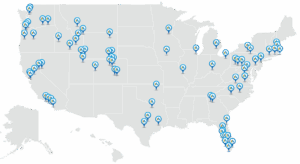PFAS in Our Backyards
On April 26th, OutThere Colorado, an online publication featuring news regarding some of the most scenic and interesting things happening in the 38th state, published an article indicating that PFAS—or per- and polyfluoroalkyl substances—had been found at elevated levels in none other than Frisco, where some of my family resides for much of the year. The information OutThere cited was reported by CBS4, a local news station, which looked at State Health Department testing results from the summer of 2020 that indicated PFAS was detected at a concentration of 58.5 ppt, or parts per trillion, in the town’s water supply. This concentration is under the EPA’s 70 ppt guidance value, but over thresholds set by several states including Massachusetts (20 ppt), Vermont (20 ppt) and New York (10 ppt). The Town of Frisco did not notify residents as the levels were below Federal thresholds, and there is no state regulatory guidance regarding these chemicals. Not yet, anyway.
It was interesting timing, given that we were discussing PFAS over the weekend, as I reflected on a work meeting I had on Friday with some colleagues in the waste disposal business. We had been discussing the treatment and disposal of PFAS, and the challenges associated with current technologies. My family wasn’t familiar with PFAS—I explained that they are chemicals manufactured to have amazing properties—heat-resistant, stain-repelling, tough and persistent—they also have some troubling health effects, including negative developmental, reproductive and immunity impacts.
Colorado’s Department of Public Health is currently looking at PFAS and has taken a number of steps to start to understand where PFAS impacts may be elevated within the state. Surveys have been conducted and findings compiled, and it is likely that more progress will be made regarding PFAS in the coming year. The Federal government is also making strides to regulate PFAS, much of this is covered on several of our earlier blogs; expect an update from us on our upcoming webinar in June (stay tuned for details). In addition, on April 27th, EPA’s Administrator Regan called for the creation of an “EPA Council on PFAS” which will look to develop a multi-year strategy to address PFAS concerns and establish new strategies and priorities. The EPA will look to work with local communities, State and Tribal agencies to develop collaborative approaches to PFAS.
As reports of PFAS in our towns and cities water supplies continue to rise, what do we tell our friends and families they can do to protect themselves? For one, activated carbon filters are a great first line of defense in removing many unwanted chemicals and flavors from our water. If you aren’t using an inline filter in your refrigerator or if yours has been blinking “replace” for a number of months, it’s probably a great time to order a new one. Other carbon-activated filters such as Brita or Zero water can also be used.
You can also write to your policymakers—your state and local representatives, about your concerns. Much information can be found on the EPA’s website or on your State’s Health Department or Environmental Regulatory Body’s website. Take time to read, educate yourself, and know that we are finding new ways to treat and remediate chemicals such as PFAS all the time.
Finally, take a deep breath. It is frightening to think that unseen chemicals could be impacting our health. But know that there are scientists and engineers, like those of us at Apex, along with policymakers in both our Federal and state agencies, doing all we can to solve these challenges. Because it’s not just our jobs. It’s our lives, and our families at stake.
Apex Associated Press (Apex AP) represents contributions from various authors within the Apex professional community.
Disclaimer
Please note that all content provided on this blog is for informational purposes only and does not necessarily represent the views, opinions, strategy, or methods of Apex Companies, LLC (Apex). Apex makes no representations as to the accuracy or completeness of any information on this site or found by following any link on this site. Apex will not be liable for any errors or omissions in this information nor for the availability of this information. Apex will not be liable for any losses, injuries, or damages from the display or use of this information. Apex reserves the right to edit or delete any comments submitted to this blog without notice to whoever wrote, submitted or posted the comment. Anyone who submits or posts any material to this blog waives any right or claim to privacy with respect to the content submitted or posted. By submitting or posting any content, the person or entity that does so is representing that they believe it to be accurate, have a legal right to the content, and have legal authority to submit or post it. Please do not submit or post anything if this is not the case. Please consider these requirements carefully when submitting or posting comments, photographs or other material relating to third parties who may have privacy, ownership or other rights implicated by the content. Readers are encouraged to seek professional legal, scientific, and/or engineering consultation concerning specific environmental, engineering, or other concerns. If you would like to contact Apex for more information regarding professional consultation to address your specific concerns, click here.






